The election campaign at Peking University (November 1980)
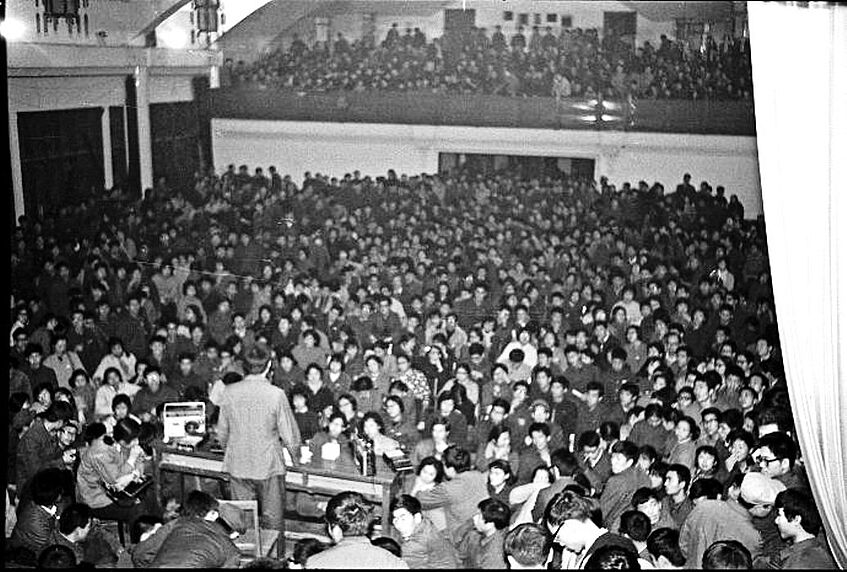
Questioning candidates in the main auditorium of Peking University.
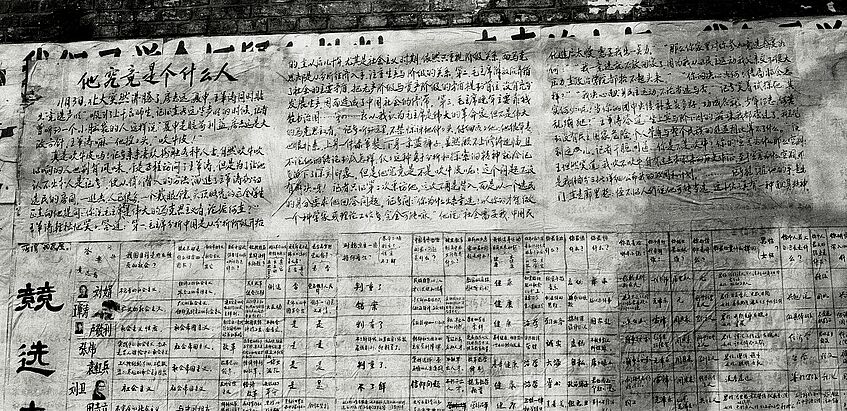
"What kind of people are they" - survey and presentation of 18 candidates for the Haidian District Assembly (Peking University, November 1980).
A Pluralist Elections Experiment
Strictly speaking - with the exception of present-day Taiwan - China has never experienced free nationwide elections, even during the "Republic of China" era there were at best partial elections that have hardly conformed to Western standards of parlamentarian democracy.
After the founding of the People's Republic, an indirect electoral system following to a large extent the example of the Soviet Union, was put in place. It allowed for a direct popular vote at the lowest level in villages and communes. They then chose delegates for institutions at the next superior level. There were exactly as many candidates as seats to be filled, and the candidates could only be voted en bloc with yes or no.
Morover all candidate lists had to be approved by a Communist Party body (usually a party-led electoral committee), and normally there were no public debates, discussions of electoral platforms or canvassing for votes. Elections rather constituted a formality that sometimes even turned into a popular celebration, and results commonly showed close to a hundred percent "yes" votes.
During the political turmoil of the 1960s and 1970s even such ritualized "elections" did not take place any more. Thus the new electoral law promulgated by the People's Congress in July 1979 (which came into effect on January 1, 1980) actually brought a number of quite drastic changes compared to the provisions of the old 1953 legal text.
For example the new rules provided for the possibility to name more candidates than seats to fill, and they stipulated an open nomination process. There were also to be direct elections for the higher rural and city district level. Every organization and individual - supported by at least three persons - should be allowed to propose candidates, the final selection had to take place in "democratic consultations" or primary elections. (A summary of the new electoral system has been given in 1982 by Brantly Womack in the journal "Asian Survey".)
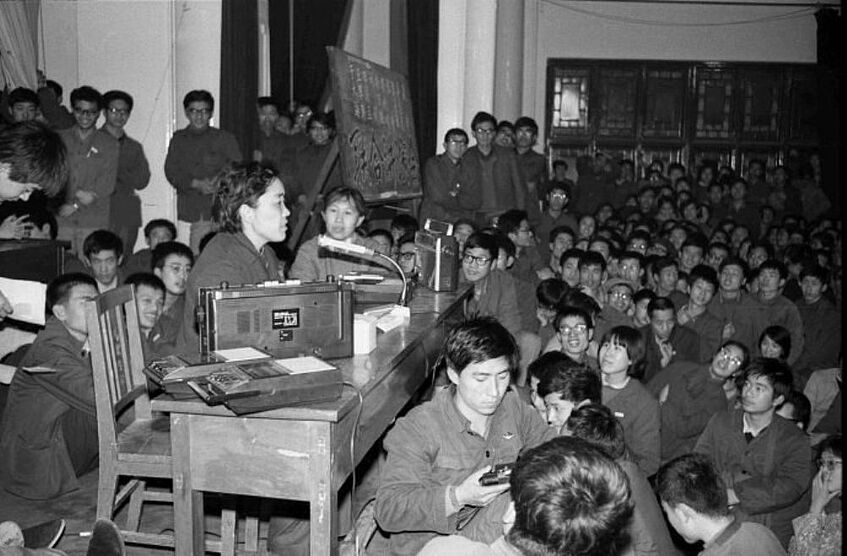
Ten candidates stage a public electoral debate at a university hall on November 28, 1980. Female candidate Zhang Manling speaks on the role of women in Chinese society.
"Electoral Campaign" at Peking University
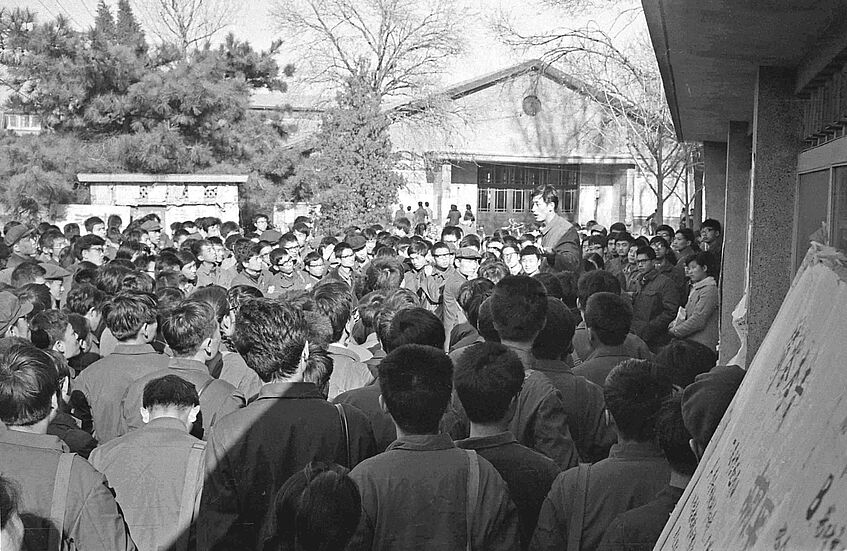
Open-air meeting with the candidate Yang Lichuan at the university's "Triangle Square"
"Electoral Campaign" at Peking University
The primary elections at Peking University (e.g. to chose three official student candidates) were at first scheduled for the end of November 1980. The students had their own constituency, the other Peking University constituency was formed by teachers and gereral staff.
During several weeks before the elections the campus saw a lively and diverse campaigning, with speeches by candidates, public debates, election platforms and big-character posters and journals that promoted the views of those running for seats.
Eventually there were 29 candidates to run for the two student seats in the Haidian (海淀) People's Congress (at least the official results of the primaries list that many names, there had been several additions and withdrawals beforehand).
Among the candidates there were some well-known civil rights activists who had already been known as authors of dazibao at the Democracy Wall or in one of the independent magazines a year before. One female student (there were at least four female candidates) focussed on the situation of women in Chinese society. As a whole there were candidates both critical to the government and close to the official party line. ABC correspondent Jim Laurie has produced a TV Report on the Peking University electoral campaign in 1980.
Most candidates invited to public debates either outside on the campus grounds, in the dining hall or in one of the university auditoriums. Often several hundred students attended, and at a few instances (like the big presentation of ten main candidates on November 28) there were even more than a thousand. Election platforms were usually posted at the central "Triangle Square" (三角地), where they were eagerly read and copied.
The platforms and debates rarely touched upon local or academic issues, usually they related to the big national topics such as political freedoms and rights, the appraisal of Mao and the Cultural Revolution, the economic situation, theory and practice of "socialism" and issues of the role of women.
On posters and chalkboards candidates presented their CVs, electoral promises and sometimes also lengthy treatises that reminded more of the traditional political speak than of the rhetorics of the new civil rights movement.
On one of the posters 18 candidates are presented with a small photo, and all of the given brief answers to concise questions on current topics (e.g. "What do you think of Mao?" or "How do you see the leading role of the Communist Party"). The answers usually do not appear very radical, at least less candid than in some of the oral debates.
Therefore many comment in a positive way on Mao ("a great Marxist"), few make a critical remark. On the Cultural Revolution opinions are generally negative, some call it a "failed revolution", a "terrible chaos" or a "reactionary development". Asked for the "most important task for current politics", many name "Democracy" or "democratic reforms", only a few put economic reforms or an improvement of the standards of living in the first place.
Only a minority questions the leading role of the Communist Party, but some speak, in response to other questions, of "structural reforms" or fighting "bureaucratism". And concerning the civil rights activist Wei Jingsheng (who has already been condemned to 15 years in prison at this time), most say that the verdict was "too harsh", that a new "transparent" trial should be held and clear evidence presented.
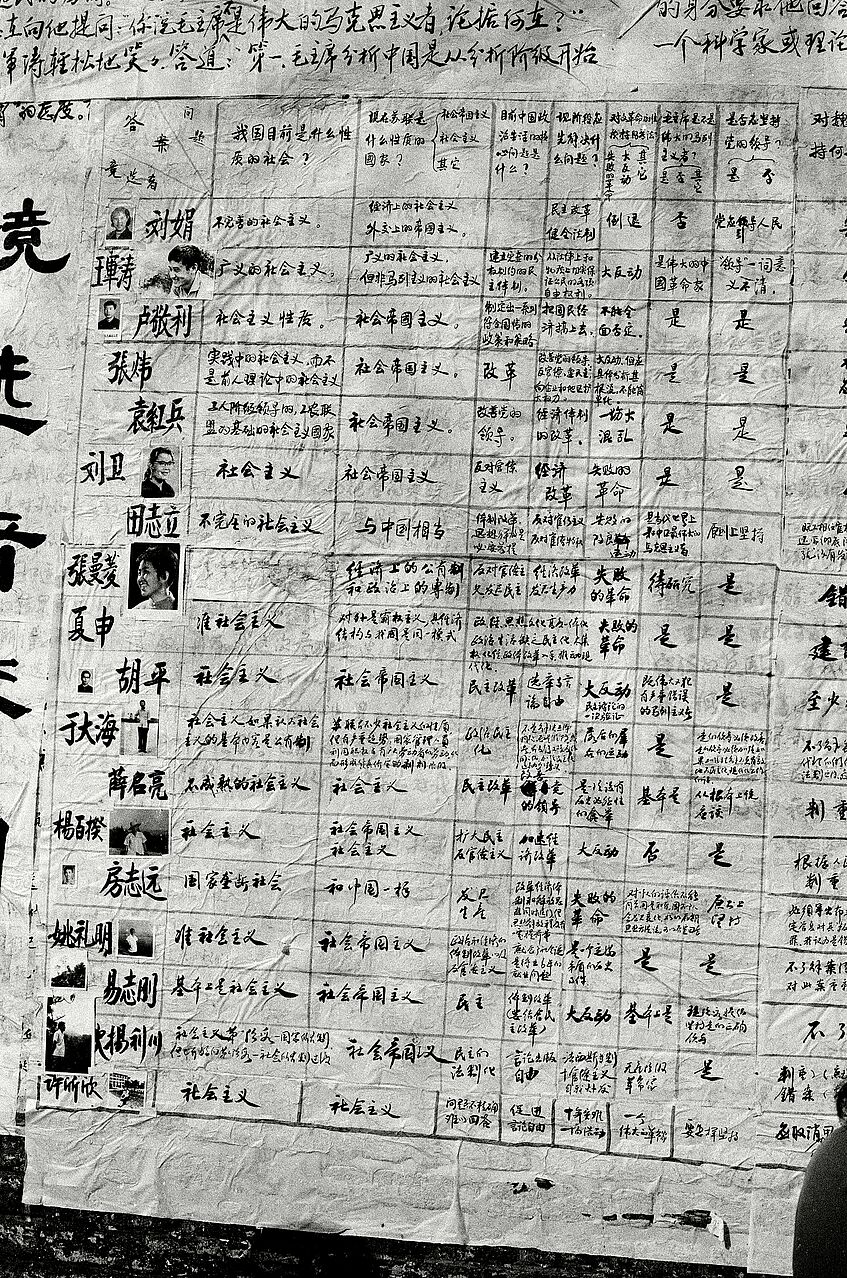
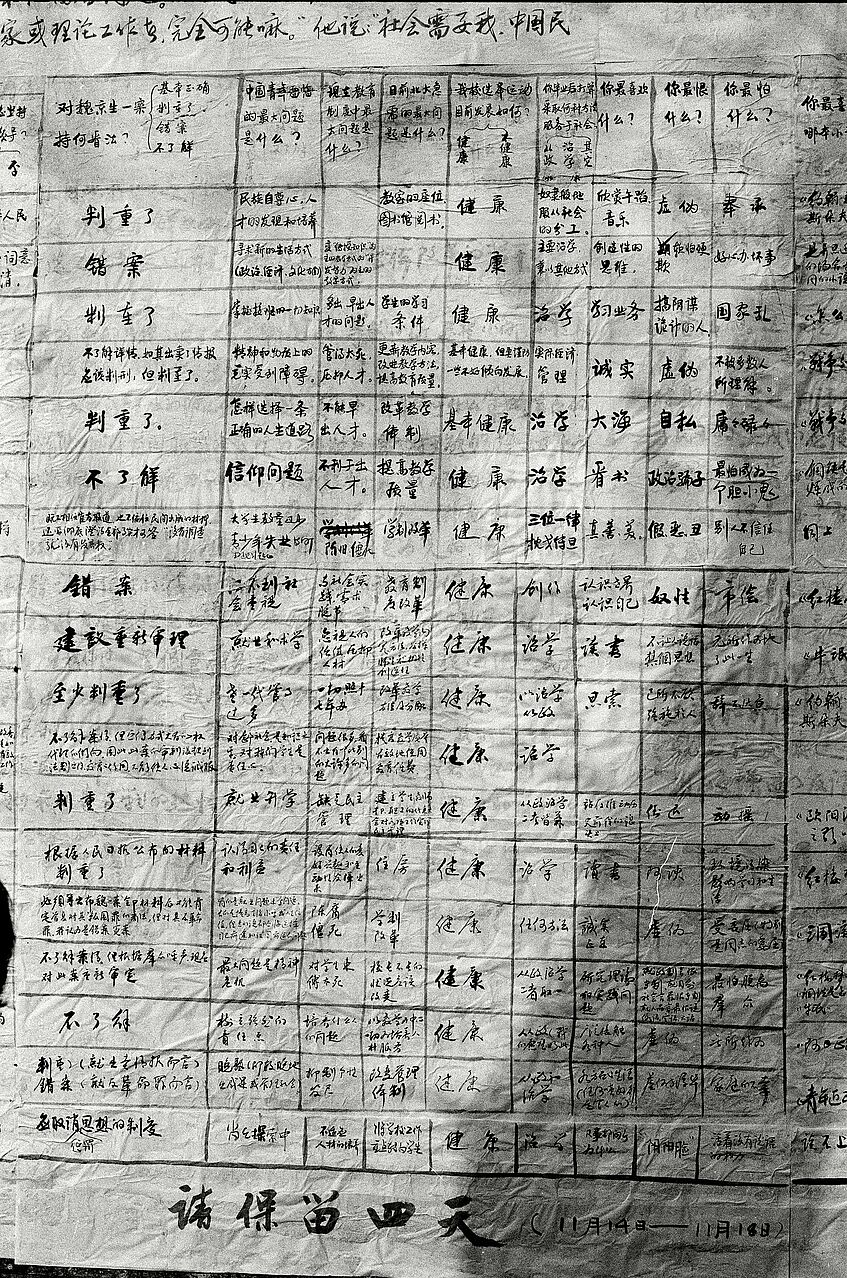
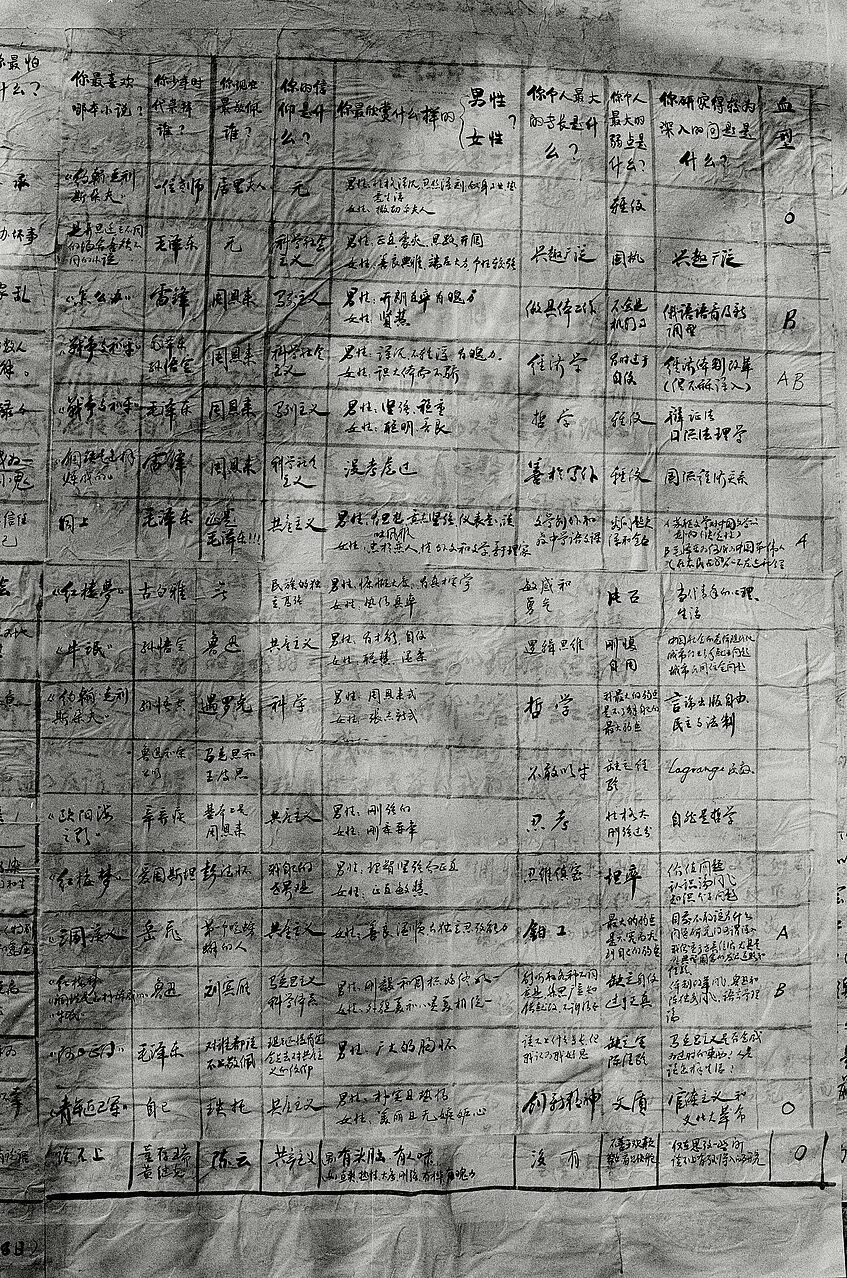
The Candidates
There are almost 30 candidates contesting the two seats in the Haidian District People's Congress that are reserved for the student body of Peking University. Most of them actively participate in the campaign for the first round of the elections, but there quickly emerge less than a dozen candidates who succeed to attract at their rallies more auditors than the others, and whose demands and suggestions are more hotly debated among the students.
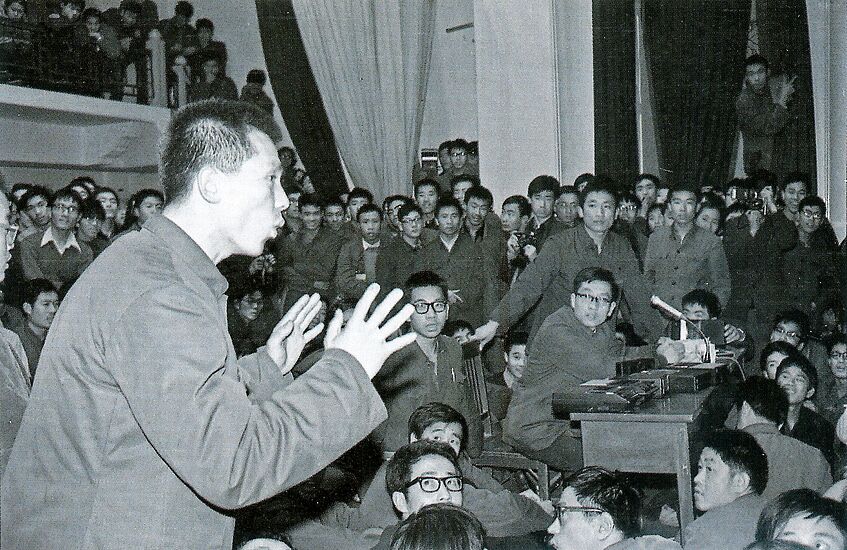
At an electoral meeting a participant discusses with Hu Ping (in front of the microphone)
Hu Ping (胡平), a research student of philosophy, focusses in his "electoral program" on the freedoms of expression and of the press. He says these are "the most basic rights of citizens", and "enjoying them has not yet won everything, but without them everything else would be lost." The level of democracy also depends on the development of productive forces, therefore it needs to be unfolded cautiously. But China's low economic level must not prevent the society creating a solid base for Democracy. The most important instrument that already gives a lot of power to the people even under such limited circumstances, he adds, is the freedom of expression. Hu Ping presents himself as a prudent theorist and critic of the system.
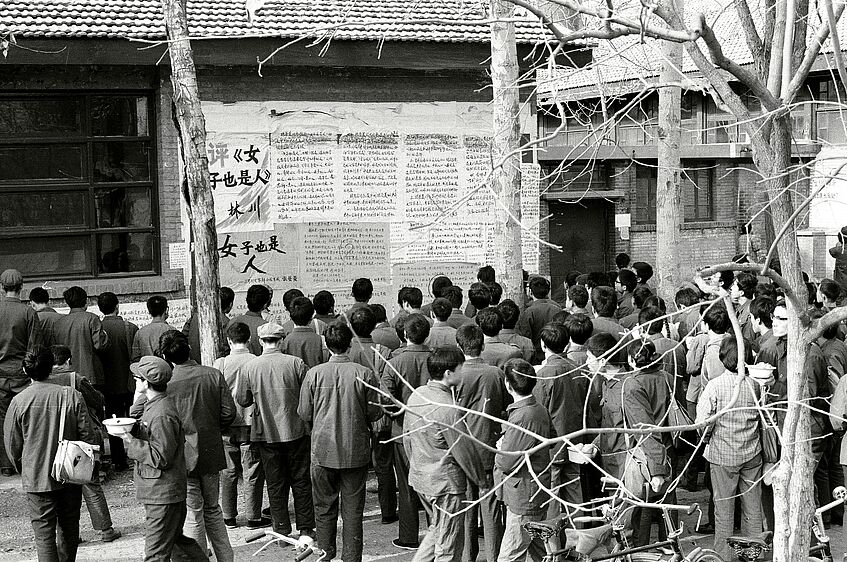
A critical response by candidate Lin Chuan to Zhang Manling's dazibao "Women are also Humans"
The literature student, author and female candidate Zhang Manling (张蔓菱) is one that everbody talks about. She is focussing on women's issues, but her (both male and female) audience is deeply divided. Her assertion that Chinese women should primarily emphasize their feminine features and their "Oriental Beauty" (东方美) just as men should stress their masculinity, receives broad approval as well as strong contradiction. And she says, women should "at the same time be elegant, active, intelligent and gentle", and society should not just treat them as "pure labor force".
When some of her fellow students attack her personally during a late-night debate, she posts a passionate dazibao the following day titled "Women are also Humans" (女子也是人) that draws again - sometimes a bit confused - counter-polemics.
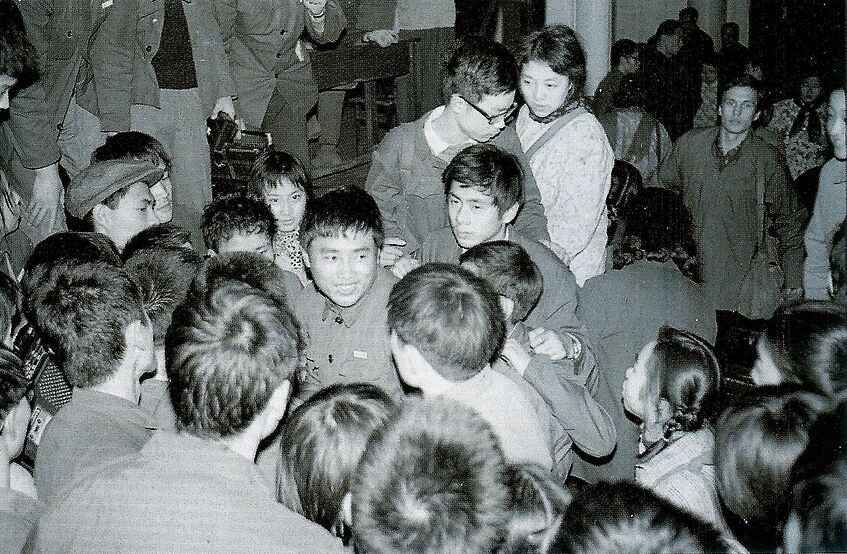
21 years old Wang Juntao discussing with voters
Wang Juntao (王军涛) from the Technology and Physics Department, was already a key figure in the 1976 Tiananmen Movement. He is closely linked to the Communist Youth League (and later becomes an alternate member of its Central Committee), and reformist Party Secretary General Hu Yaobang will at some point receive him for a personal discussion.
In his political treatises Wang delivers a very critical judgement on the Cultural Revolution and other deviations in party history. He wants to fight corrupt cadres, and democratize the political system. Mao, he says in one of the electoral debates, was not a Marxist but a dictator, because he never implemented the kind of democracy practiced by the "Paris Commune" (of 1871) although Marx had repeatedly praised it.
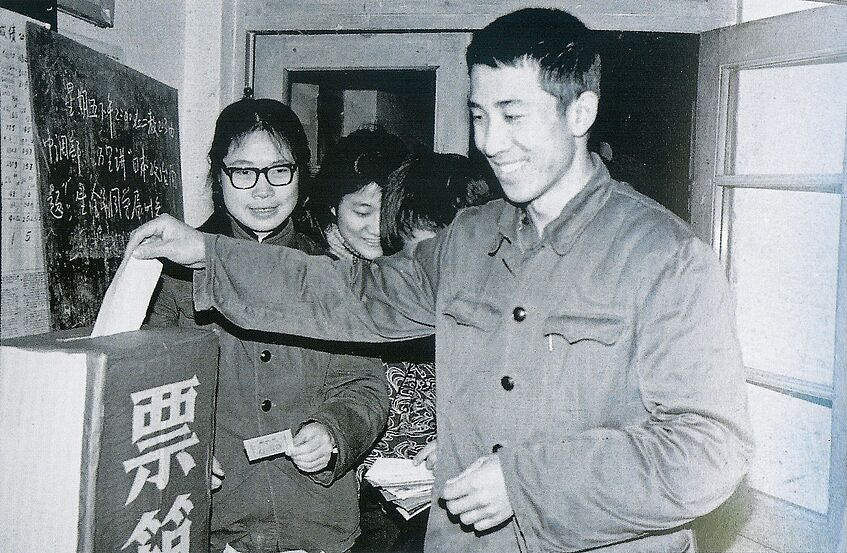
Fang Zhiyuan casting his vote on December 3, 1980
Fang Zhiyuan (房志远) is a student of international relations. One of his manifestos carries the headline: „socialism = public property + democracy“. Fang is also (like Wang Juntao and Hu Ping) linked to the independent journals of the Democracy Movement, he represents the Guangzhou Magazine "Voice of the People" in Beijing. Fang is critical of Mao, questions the leading role of the Communist Party, advocates a multi-party system, and strongly defends the freedoms of expression and the press. To underline this, he drafts an outline of a new media and publication law.
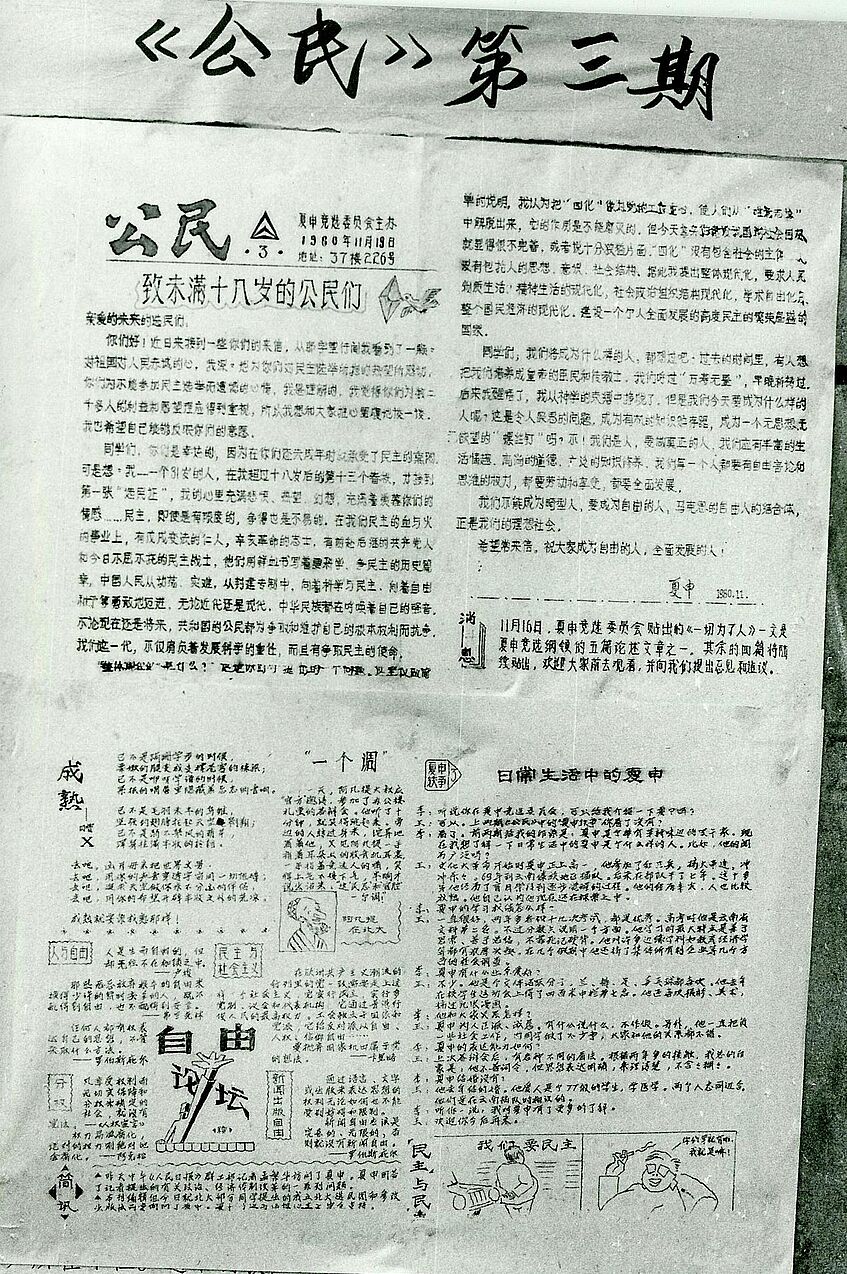
The electoral Magazine "The Citizens", edited by Xia Shen
Xia Shen (夏申) is a particularly active candidate who writes numerous treatises, publishes his own campaign Magazine "The Citizens" (Gongmin 公民) and organizes several rallies and meetings. He makes known his opinions on many diverse topics, though his arguments often sound a bit complicated. He claims in a pre-election interview that "Marxism is only part of the outstanding cultural heritage of mankind", Marx has died more than a hundred years ago, the world has greatly changed since, one cannot find all the answers with Karl Marx any more, but people could ask how Marx would have dealt with a specific problem.
Although himself a Communist Party member, Xia says in response to a question, that party interests do not stand above people's interests – if he were elected, he would in the first place follow the interests of the people. He also says: "We have to diversify power, give it back to the people, democratize political and economic power, and liberate thought."
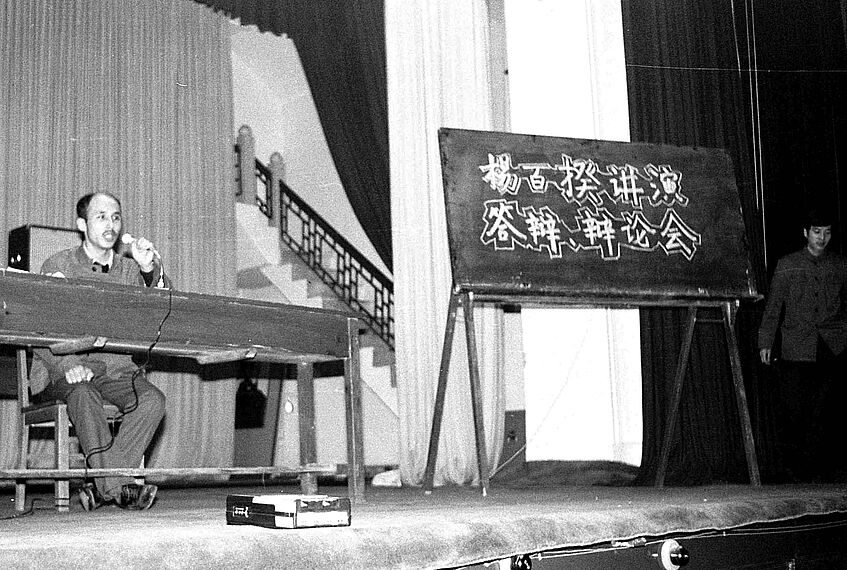
Yang Baikui at an electoral debate
Yang Baikui (杨百揆), again a student from the Department of International Relations, speaks of the ten years of the Cultural Revolution as a "big step backwards into feudalism". Asked whether political or economic reforms were more important, Yang says that China first of all needed a renewal of its economy and "personal freedom", only on that basis it could implement additional freedoms like those of expression and the press. The educated elites in his opinion play an important role in that, "intellectuals are the most progressive force in society," says Yang.
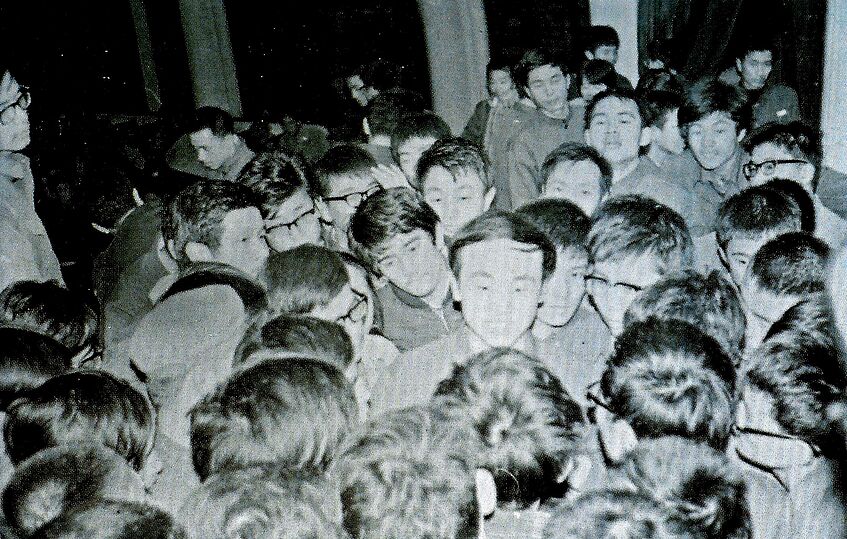
Zhang Wei surrounded by potential voters
The candidate Zhang Wei (张炜) from the Economics Department, supports close ties of the intellectuals with workers and peasants - just as Mao has repeatedly demanded. Zhang presents himself as an advocate of moderate reforms. He is the chairman of the university's Student Council and therefore more than the others a candidate of the political establishment. Nevertheless he also speaks of "reforms", "democracy" and fighting "bureaucracy", and in his electoral platform he says that democracy could not be exchanged for "temporary stability" or "economic prosperity".
A marginal anecdote: Zhang was supported by Li Keqiang, who was a student at the Economics Department at that time, and later became prime minister, as Chen Ziming writes in his account of the 1980 elections. (Chen Ziming: Xianzheng de mengya. 1980 nian jingxuan yundong [Keime des Konstitutionalismus. Die Wahlkampfbewegung 1980]. 2 Bände. Zhenxiang Chubanshe. Hongkong 2013, S. 601) You can find Li Keqiang's name on a campaign poster supporting Zhang Wei.
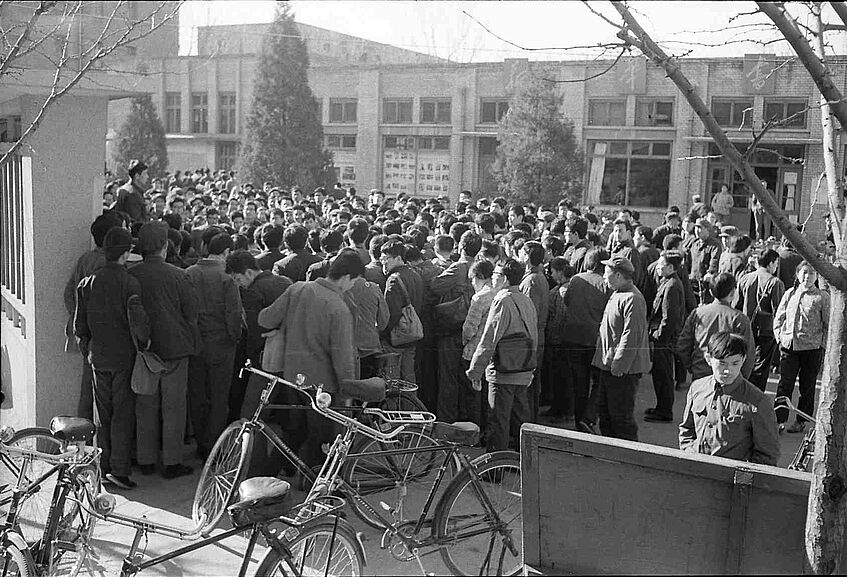
Yang Lichuan speaks at the "Triangle Square"
Yang Lichuan (杨利川), a student of philosophy and Party Secretary of his graduate class, stands out by his unconventional style of campaigning. He gives speeches from a rostrum outside (while most of the others invite to one of the auditoriums), he repeatedly appears at rallies of his competitors to give his own opinions (and he sometimes brings along a megaphone to make himself heard), and he also warns of "political seducers" among the other candidates. For socialism he sees a "crisis of confidence", but he would still like to develop and democratize it.
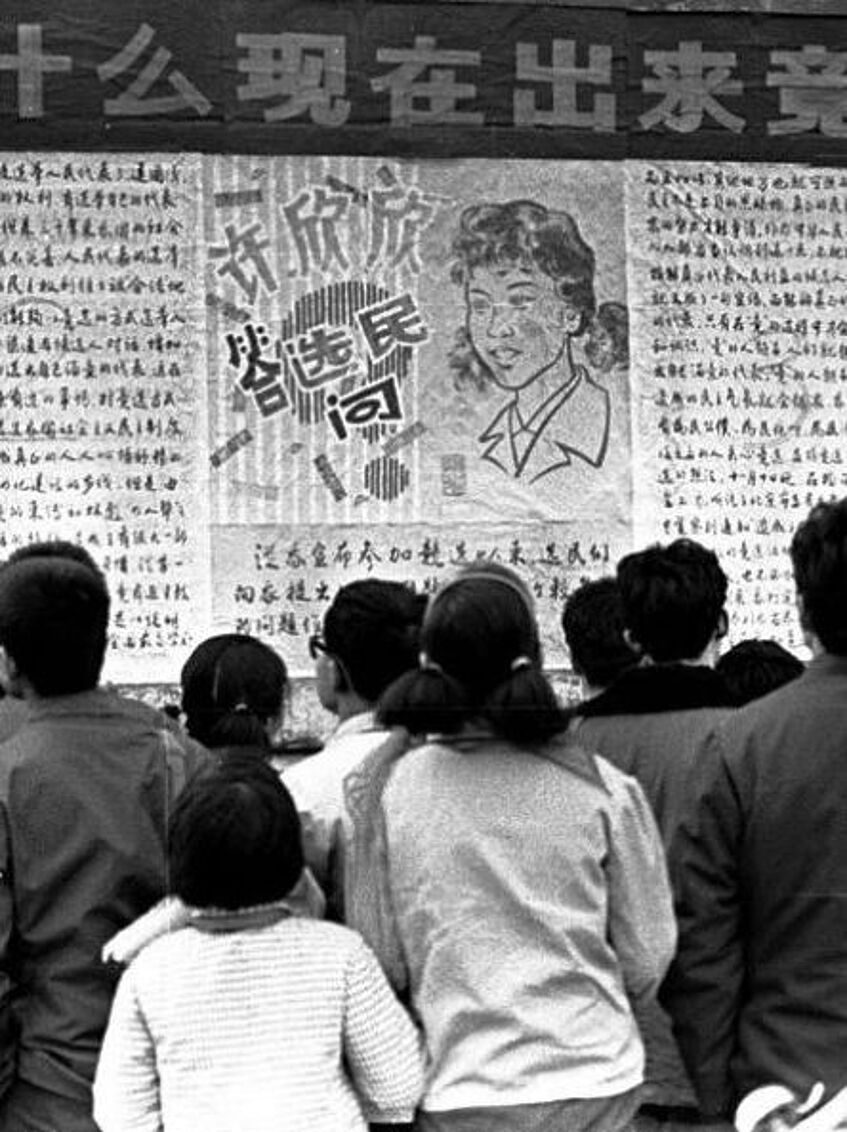
"Xu Xinxin answers to questions from the voters"
Liu Juan (刘娟) does not write lengthy treatises herself, but she publishes a number of surveys and research studies on the situation of female students at Peking University, on health issues and some practical problems of campus life. Her motto for the elections: "Everything for the free development of human beeings".
Other candidates who caught some public attention are Tian Zhili (田志立), Yu Dahai (于大海), Yao Liming (姚礼明), Yi Zhigang (易志刚), Lu Jingli (卢敬利), Yuan Hongbing (袁红兵), Xue Qiliang (薛启亮) and Yao Liming (姚礼明) as well as the two female contestants Liu Wei (刘卫) und Xu Xinxin (许欣欣).
The Election Results
Because of the large numbers of participants, a primary election shall first decide on the three official candidates for the two seats at stake. This first round takes place on December 3 (a week later than originally scheduled).
Hu Ping, Wang Juntao and Zhang Wei receive the most votes, and become the candidates for the main round on December 11. The polls end with a great surprise and embarrassment for the authorities. The two candidates who come in the first places are well-known democracy activists and "veterans" of the Tiananmen protests of 1976, and were also regular contributors to the independent journals.
6094 eligible voters eventually cast their ballot, which means a turnout of 91,2 percent. Hu Ping receives 3467 votes, Wang Juntao 2964, and Zhang Wei 2052. Hu is thus formally elected as a People's Congress deputy, Wang though has narrowly missed the 50 percent of eligible voters necessary to pass. Therefore a week later a runoff is held between the two remaining candidates, but because of a lower turnout, again no one exceeds the 50 percent.
At this point the electoral process is called off, the second student seat in the local assembly is left vacant. The successful candidate Hu Ping eventually learns that the political significance of his election victory remains doubtful. The university superiors first put pressure on him not to take up his seat, Hu Ping still insists and participates in the first meetings, just to find out that he remains cut off from relevant information, and that there is little to decide for the "people's representatives".
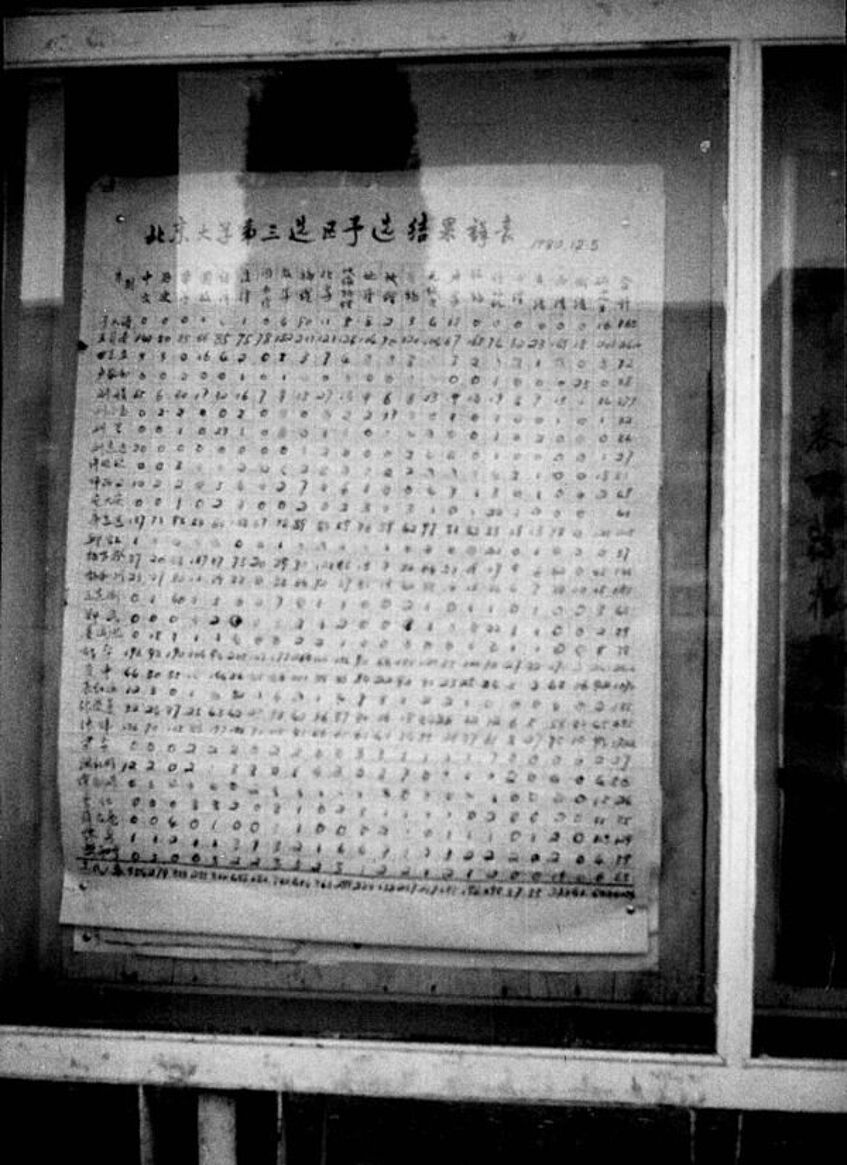
The results of the first round of the pre-elections are posted at Peking University (Dec. 5, 1980).
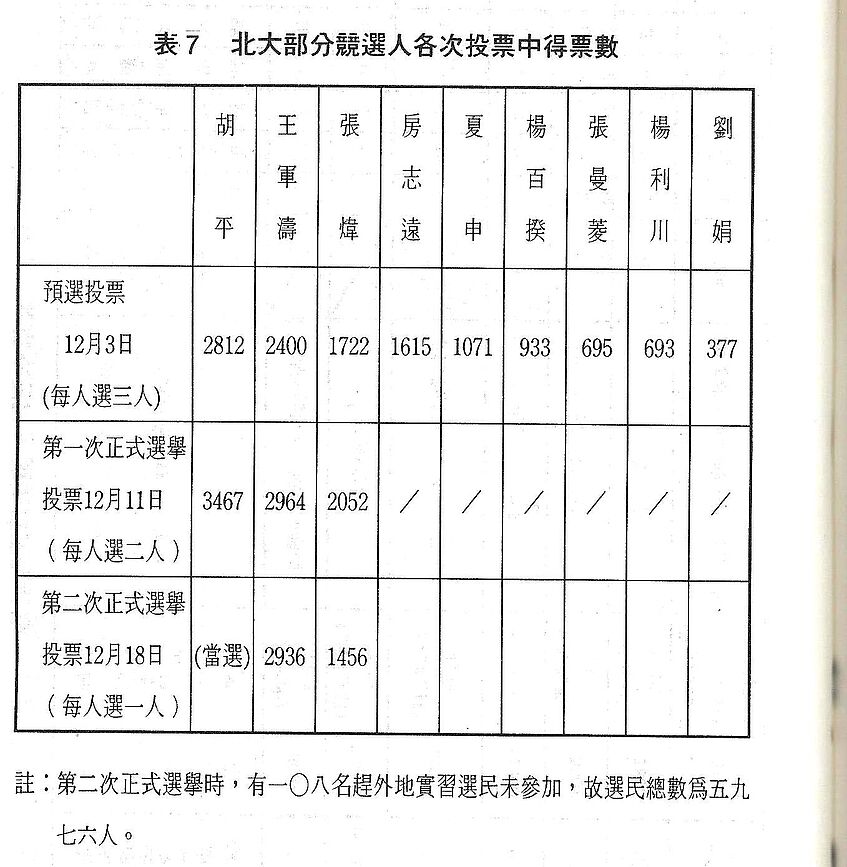
The official election results; from Wang Juntao, Hu Ping: Kaituo - Bei Da Xue Yun Wen Xian (Preparing the ground – contributing to the students‘ movement at Peking University). Hong Kong 1990
Pluralist Elections at Other Academic Institutions
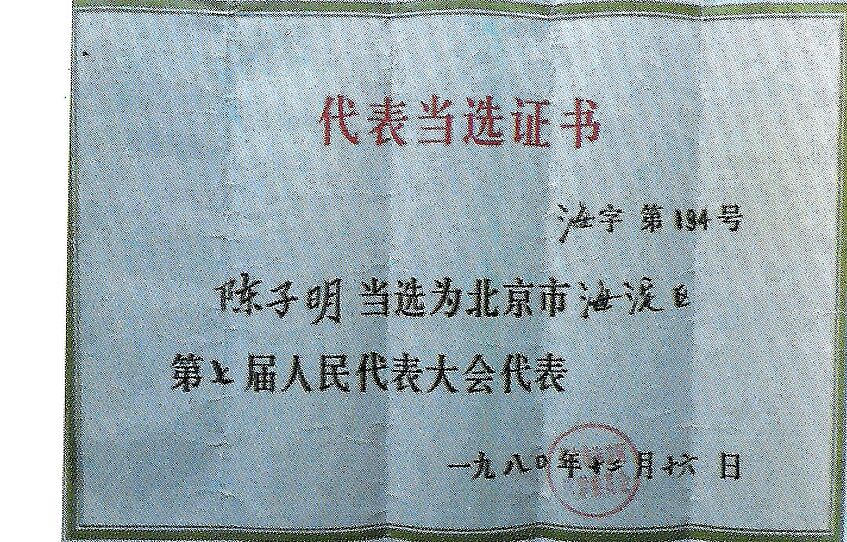
"Election Certificate - Chen Ziming has been elected member of the 7th People's Congress of Haidian District. December 16, 1980"
Pluralist Elections at Other Academic Institutions
There are a number of other academic institutions, where electoral campaigns unroll in a similar way as at Peking University, notably at Tsinghua University (清华大学), at the Beijing Normal College (北京师范学院), at the Chinese Academy of Science (中国科学院), at Shanghai's Fudan University (复旦大学) and at a number of other colleges in Wuhan, Guiyang, Qingdao and Changsha. A few other activists of the Democracy Movement win seats for local assemblies, such as Chen Ziming (陈子明) in Beijing or Fu Shenqi (傅申奇) in Shanghai. But also in their institutions such pluralist elections - accompanied by open and profound debates on the big issues of Chinese society - remain a one-time event.
In 1982 the National People's Congress passes a new by-law that limits the possibilities of future elections. Public electoral campaigns cannot be held any more, and candidates are now explicitly required to be "devoted to socialism".
